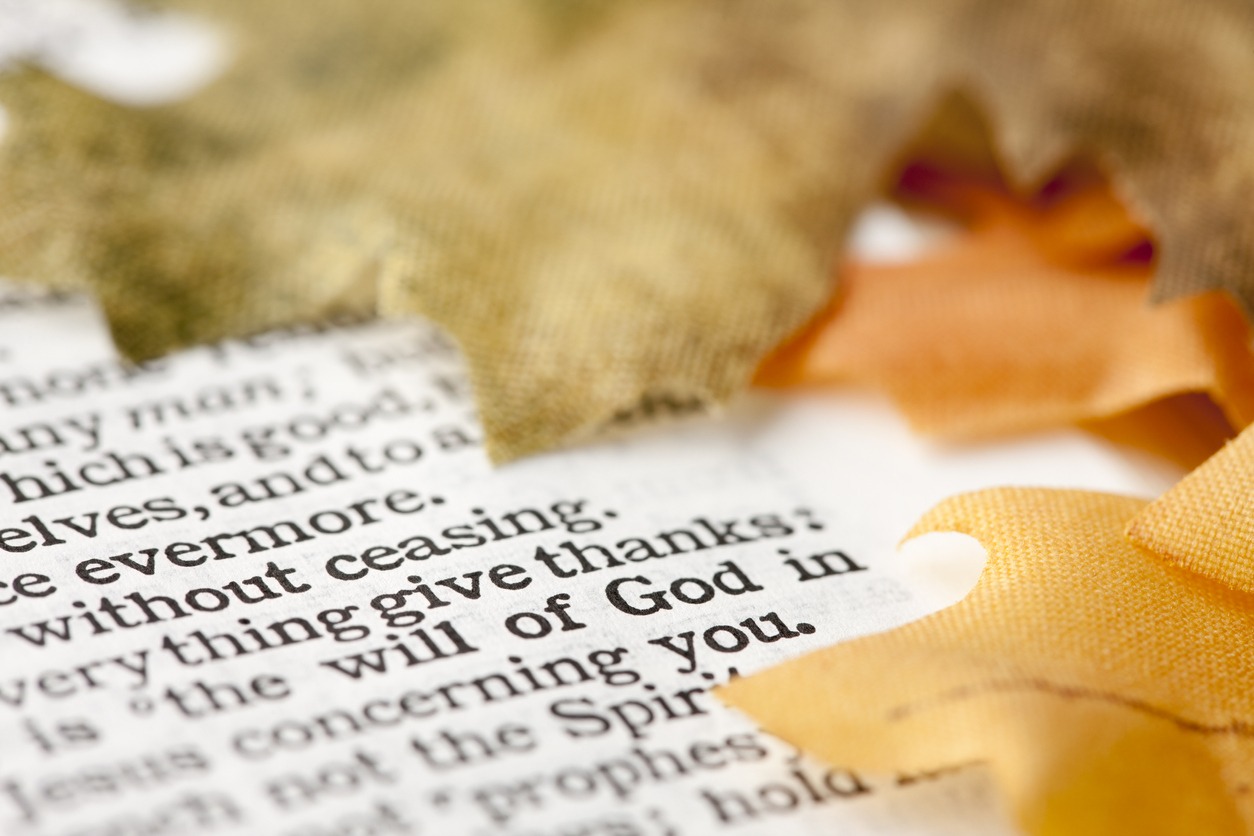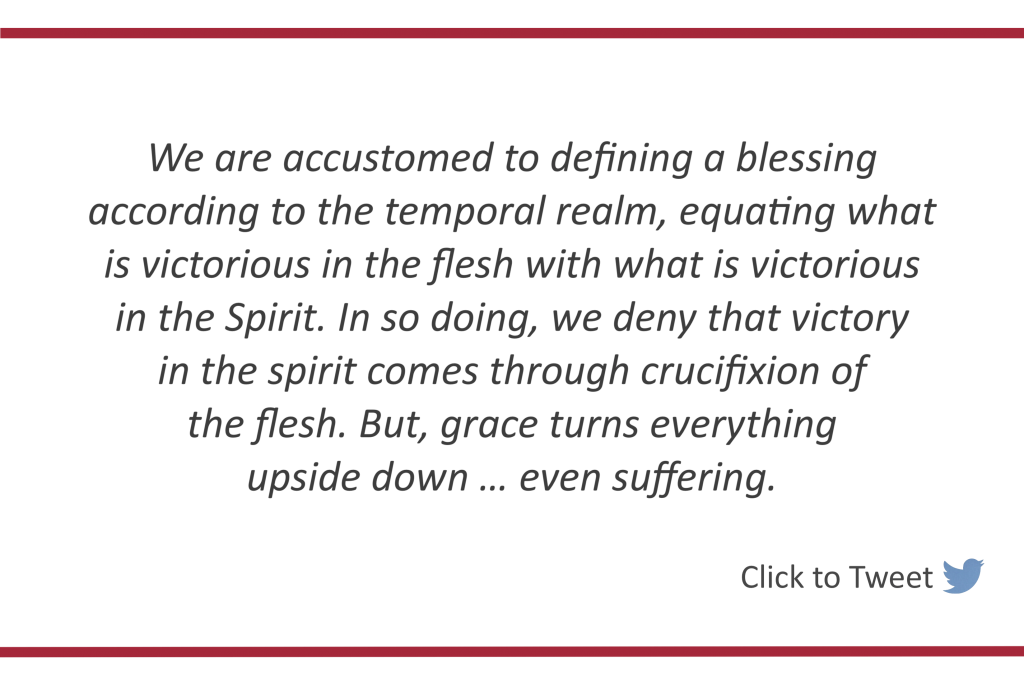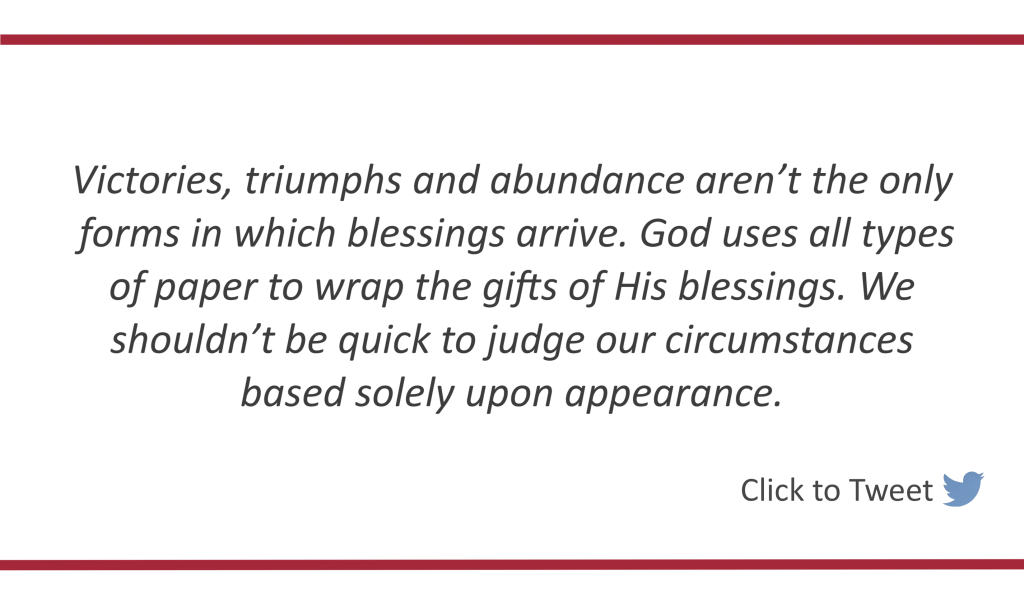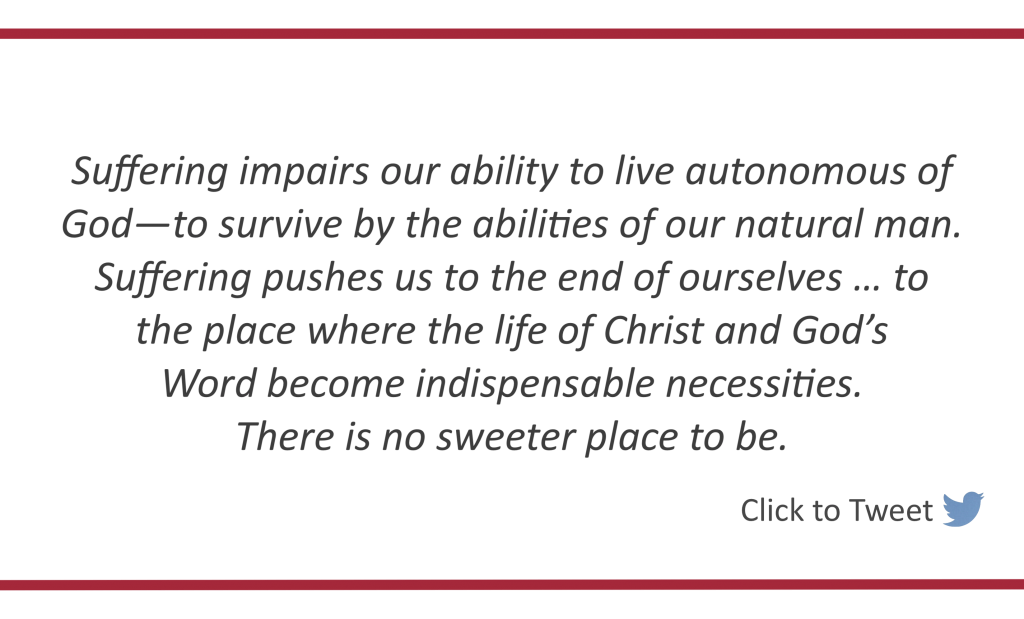Finding Contentment and Thanksgiving in Suffering, Part Two

In Part One of this post, we discussed the fact that suffering is “having what you don’t want and wanting what you don’t have.” By those terms, everyone is experiencing a measure of suffering.
It is possible to find contentment and thanksgiving in our suffering because of Jesus Christ. Knowing Him more fully is the greatest gift we could ever receive. But it often takes experiences of suffering for us to pursue Him, depend on Him, cling to Him—and come to know Him more fully. For that reason, suffering is a blessing.
Is Suffering Actually A Blessing?
We usually reserve the word “blessing” for those things that bring us pleasure in the temporal realm. But it is only in suffering that we learn to identify with Christ and His suffering on the cross for us. It is often only in suffering that the hold the world and our natural man have over us is shattered. It is often only in suffering that we see what is actually real and lasting.
“So if you’re serious about living this new resurrection life with Christ, act like it. Pursue the things over which Christ presides. Don’t shuffle along, eyes to the ground, absorbed with the things right in front of you. Look up, and be alert to what is going on around Christ—that’s where the action is. See things from his perspective. “
3-4 Your old life is dead. Your new life, which is your real life—even though invisible to spectators—is with Christ in God. He is your life. When Christ (your real life, remember) shows up again on this earth, you’ll show up, too—the real you, the glorious you.” (Colossians 3:1-4, MSG)
Christ is our real life. Without the presence of suffering, we would accept the illusion, the deception, that the temporal world is what is real. Without discomfort, we tend to shuffle along, eyes to the ground. We don’t look up! Responding Biblically to our suffering, we look up!
When we look up, we see that everything in God’s economy is upside down compared to ours.
Grace turns everything upside down. The last are made first. Life comes through death, Justification is by faith, not by our good works, God’s power accomplished in our weakness, not our strength.
We are accustomed to defining a blessing according to the temporal realm. We equate what is victorious in the flesh with what is victorious in the Spirit. And in so doing, we deny that victory in the spirit comes through crucifixion of the flesh. Yes, grace turns everything upside down … even suffering.
When I was sick and confined to the house, I watched a lot of Christian television. One year, prior to an NFL division playoff game, I saw interviews of Christian players from both teams. The players from both teams thanked God for the blessing of competing in the playoff game, as the winning team would compete in the Super Bowl.
“God is so good! This is such a blessing to have the chance to go to the Super Bowl,” one player said.
“I can’t believe God’s goodness,” another player said. “What a blessing to be here in the playoff game!”
Players from both teams acknowledged God’s blessing on their lives and their teams. Then … one team inevitably lost. As the Christian players on the winning team were interviewed, they of course thanked God.
“Wow! What a blessing! We get to go to the Super Bowl!” one player exclaimed.
“God has truly blessed us,” another player said. “I never imagined He would allow me to play in the Super Bowl.”
Lying there in my mid-twenties, my life suddenly halted by an illness that had imprisoned me in a wheelchair, in my body, and ultimately in my mind, I felt a bit like a player who’d lost the game. I couldn’t help but empathize with the players who lost the playoff game. Were they not blessed too? Was the plan of God not at work in their lives also?
Yes, they were all blessed! Both sides—winners and losers—were blessed. We don’t think of the losing team as blessed because we’re accustomed to defining a blessing according to the temporal realm.
Victories, triumphs, and abundance aren’t the only forms in which blessings arrive. God uses all types of paper to wrap the gifts of His blessings to us.
“Consider what God has done: Who can straighten what he has made crooked? When times are good, be happy; but when times are bad, consider: God has made the one as well as the other” (Ecclesiastes 7:13-14).
Wrapping Paper vs. The Gift
The wrapping paper or gift bag—the presentation of the blessing—isn’t the important part. What’s important is the gift inside! The actual gift.
Let’s suppose that this Christmas you have a gift under the tree wrapped in gorgeous, expensive-looking paper. No matter how beautifully it’s wrapped, it would seem a bit crazy for you to carefully remove the paper, put it in a treasure box, and throw the gift away. What if the gift was a diamond ring … or the keys to a new car?
It’s insane to mistake the wrapping for the gift … but we do it all the time.
Sometimes when I speak and tell my story, I will try to give someone in the audience a gift. They never want to take it, though. That’s because there’s a catch. It’s not really a gift, or so it appears. What I am trying to hand them is a ball of trash—old newspapers, grocery bags, dirty Kleenexes—bound together with thorny vines. Not only is it ugly and dirty … it’s painful, inflicting discomfort at the slightest encounter.
No one ever wants my treasure. It appears like trash to them (and judging from the exterior alone, it is).
“One man’s trash is another man’s treasure,” I say as I begin carefully peeling away the “wrapping paper.” It takes time and great care to remove the thorns without hurting my fingers, but it can be done—slowly … with patience.
After a few moments, the gleam of a gold jewelry box begins to emerge from within the ball of thorny trash. The audience collectively gasps and begins to realize they misjudged my treasure.
Gradually, with a little more careful removal of the wrapping, I slip the jewelry box out of the glob of trash and open it to reveal what’s inside—the treasure they would have thrown away. So what’s inside? A $5000 gold, diamond ring.
In the same way, we shouldn’t be quick to judge our circumstances based solely on appearance. If we do, we could resent or even discard the most invaluable gift we could ever receive—that of knowing Jesus Christ more intimately.
There is treasure within your suffering today. Your trials and afflictions are merely the wrapping paper concealing it.
Priceless Treasure
This is why I say that the most priceless treasure I’ve ever received was the gift of knowing Jesus more intimately—literally existing by His life—because of the trial I went through.
This incredible gift came “wrapped” in the paper of tears, loss, pain, and excruciating suffering. It was received in sorrowful hours of desperation and isolation, delivered by God’s messenger named grief. Yet, it was created and placed in my spirit by the hands of a loving but persistent Father who was not offended or affected by my clouded vision. I saw His gift only as a curse.
I initially judged the gift by the wrapping paper and almost threw it away. I certainly resented this unwelcome, unwanted delivery. It took no light measures or short duration to correct my vision. I finally came to understand that my trial was not a plague of severe loss—it was a package of pure gold.
Pushed to the End of Ourselves
Although I had a personal relationship with Jesus since childhood, I never knew how much of Him I was missing until I experienced suffering beyond my ability to endure. On my worst days, it felt like I was literally being crushed by the overwhelming trial I faced. I asked God to take me home and considered taking my life myself because it seemed the torture was more than I could bear.
This forced me to turn to God’s Word and the life of Christ like never before. They became so much more than head knowledge to me. They became my life! My existence! My joy! I had never clung to the truth and life of God’s Word so tightly. I had never needed the Spirit of Jesus Christ so desperately.
When I put my trust in Christ as a young girl, His Spirit came to dwell in me. Yet, the years of affliction brought me to a place of needing Him to live for me. There is a big difference between the two. One is me doing my best for Christ and the other is Him living my life for me.
Stripped of my abilities and unable to survive apart from Jesus, I came to exist by His life and the life of God’s Word. This is what I mean when I say that my illness has been a package of pure gold. It was the best experience of my life. Because of my affliction, I relied on God’s Word and the life of Christ. I was infused with His comfort, His peace, His strength, His joy, and His eternal perspective. I was infused with grace beyond measure—God’s comfort for life’s trials.
When we put our faith in Jesus Christ as our Savior and Lord, He comes and lives in us (see Ga. 4: 6 and 2 Cor. 1:22). As born-again Christians, we dwell on two plains: a temporal, earthly plain—in our ‘natural’ man—and a spiritual, eternal plain through the Spirit of Christ.
Suffering impairs our ability to live autonomously of God—to survive by the abilities of our natural man. Suffering pushes us to the end of ourselves … to the place where the life of Christ and God’s Word become indispensable necessities. There is no sweeter place to be.
When life is comfortable and easy, nothing nudges us to the point where God is an indispensable necessity—to the place where feeling, experiencing, seeing, and hearing Him are not options, they’re daily requirements.
3Let the hearts of those rejoice who seek and require the Lord [as their indispensable necessity]. 4 Seek, inquire of and for the Lord, and crave Him and His strength…seek and require His face and His presence continually evermore” (Psalm 105:3-4).
Adjusting Longings
While imprisoned in Rome, Paul received gifts from Philippian friends. “I rejoice greatly,” he said, but quickly added, “I am not saying this because I am in need…”
Seriously? Not in need? Paul was in jail. Yet he told his friends, “I am amply supplied.”
Paul exercised his spiritual arithmetic skills. He took the equation of suffering (having what you don’t want and wanting what you don’t have) and adjusted his desires in light of Christ’s sufficiency. Christ was more than enough whether Paul was “well fed or hungry, whether living in plenty or in want” (Phil. 4:12).
Possessing contentment and a grateful heart doesn’t mean we no longer feel discomfort or misery. It means that in spite of our feelings, in spite of what our natural man wants, we choose to give up temporal longings. We choose to align our desires with our citizenship in Heaven. Our circumstances are very much of this earth, but our longings, our cravings, and our values become heavenly-oriented.
In so doing, we are “sorrowful, yet always rejoicing” (2 Cor. 6:10). Joni E. Tada points out that “Godliness with contentment is great gain,” and the gain always comes through loss (1 Timothy 6:6). [i]
In The Rare Jewel of Christian Contentment, Jeremiah Burroughs writes,
[A Christian] is the most contented man in the world and yet the most unsatisfied man in the world; these two together must needs be mysterious…He is contented if he has but a crust, but bread and water…yet if God should give unto him the Kingdoms and Empires, all the world to rule…he should not be satisfied with that. A soul that is capable of God can be filled with nothing else but God. [ii]
A spirit of gratitude transforms how we receive everything else. It allows us to enjoy the obvious gifts, such as the pleasures of a warm house and a healthy family. We won’t reject these pleasures because of a legalistic desire to suffer. But neither will we clutch them greedily. Tadeusz Dajczer writes,
“A gift should be accepted with such detachment that at any given moment you could return it. This is an astonishing paradox. We are gifted so that, in accepting God’s gifts, we are ready to return them. The gesture of our readiness to return to God a gift we received, is a sign that we have not taken possession of it. It is an expression of acknowledgement of the truth that we possess nothing. A gift returned comes back multiplied. Everything is a gift—your body and soul, wife, husband, children, what you have and what you do—everything belongs to the Lord.”
Learning to think this way is not easy. For most people, it takes years of hard work for it to become a habit. And it’s not even the hardest part of cultivating a spirit of gratitude. As Paul says, he learned to be content in hunger and in want.
Let your suffering be an occasion for gratitude today. By the life and mind of Christ in you, it is completely possible! Don’t reserve the word “blessing” for mere temporal gifts. Ask God to show you the riches He has given you in Christ Jesus!
Years ago, when I allowed God to give me contentment in Christ in spite of my torturous illness, I was fully prepared to remain in that state of illness for years to come. And I would have been fully satisfied if that had been God’s will. Yet … within weeks things began to turn around. God began working through a new medical treatment. And the rest is history. …
I fully believe God was waiting for me to realize that Christ alone was not just enough—Christ alone was my everything! He was waiting for me to recognize that I’d been given the greatest gift. I finally saw things according to my real life in Christ! I’m glad He waited. I would go through it all again to discover that Christ alone is not just sufficient; Christ alone is superior!
Ask Jesus to help you discover that today—to discover the blessing of knowing and experiencing Christ more fully right there in the middle of your trial.
If our ultimate end is “to glorify God and to enjoy Him forever”—to know Him—then even suffering can be received as a great blessing.
–
More Tweetables
- We are accustomed to defining a blessing according to the temporal realm, equating what is victorious in the flesh with what is victorious in the Spirit. This denies that victory in the spirit comes through crucifixion of the flesh.
Tweet
- Grace turns everything upside down…even suffering.
Tweet
- Victories, triumphs and abundance aren’t the only forms in which blessings arrive. God uses all types of paper to wrap the gifts of His blessings. We shouldn’t be quick to judge our circumstances based solely on appearance.
Tweet
- We shouldn’t be quick to judge our circumstances based solely on appearance. If we do, we could resent or even discard the most invaluable gift we could ever receive—that of knowing Jesus Christ more intimately.
Tweet
- When life is comfortable and easy, nothing nudges us to the point where God is an indispensable necessity—to the place where feeling, experiencing, seeing and hearing Him are not options, they’re daily requirements.
Tweet
- “The most priceless treasure I ever received was the gift of knowing Jesus more intimately. It came wrapped in tears, loss, and pain. I judged the gift by its wrapping, by appearance, and almost threw it away.” — Natalie Nichols
Tweet
- There is treasure within your suffering today. Your trials and afflictions are merely the wrapping paper concealing it.
Tweet
- Possessing contentment and a grateful heart doesn’t mean we no longer feel discomfort. It means that in spite of our feelings, we align our desires with our citizenship in Heaven.
Tweet
- “A soul that is capable of God can be filled with nothing else but God.” — Jeremiah Burroughs
Tweet
–
Questions: Do you view your suffering as a blessing or a curse? How can you adjust your longings in view of Christ’s sufficiency?
OTHER POSTS IN THIS SERIES:
RELATED ARTICLES:
- God Still Clothes the Lilies, Lesson 7: Receive God’s Enabling
- God Still Clothes the Lilies, Lesson 2: View Your Needs from Heaven’s Higher Perspective
- Resting in God’s Sovereign Rule, Part 1: His Throne Rules Over All
- Resting in God’s Sovereign Rule, Part 2: Filtered Through His Fingers of Love
- Resting in God’s Sovereign Rule, Part 3: The Apple and the Alien
- Resting in God’s Sovereign Rule, Part 4: Seesaw Control: How Perspective Draws Victory from Defeat
- Resting in God’s Sovereign Rule, Part 5: Do God and Satan Alternate Shifts?
- Resting in God’s Sovereign Rules, Part 6: God Governs Hands-On, Using Even Evil for His Purpose
- Resting in God’s Sovereign Rules, Part 7: His Purpose Prevails: God’s Control Over Sinful Acts
- Resting in God’s Sovereign Rule, Part 8: Scriptures About God’s Sovereign Rule
- God Still Clothes the Lilies, Lesson 1: Rest in God’s Sovereign Rule
- God Still Clothes the Lilies, Lesson 2: View Your Needs from Heaven’s Higher Perspective
- God Still Clothes the Lilies, Lesson 3: Hope in God Alone
- God Still Clothes the Lilies, Lesson 4: Trust in God and His Deliverance
- God Still Clothes the Lilies, Lesson 5: Be Confident in God (Part 1)
- God Still Clothes the Lilies, Lesson 5: Be Confident in God (Part 2)
- God Still Clothes the Lilies, Lesson 7: Receive God’s Enabling
[ii] Jeremiah Burroughs, The Rare Jewel of Christian Contentment (Carlisle, Penn.. The Banner of Truth Trust, 1992), p. 46

Disclosure of Material Connection: Some of the links in the post above are “affiliate links.” This means if you click on the link and purchase the item, Shades of Grace will receive an affiliate commission. Regardless, I only recommend products or services I use personally and believe will add value to my readers. I am disclosing this in accordance with the Federal Trade Commission’s 16 CFR, Part 255 “Guides Concerning the Use of Endorsements and Testimonials in Advertising.”









 “Natalie Grace Nichols is experiencing God’s grace and freely expressing it. My wife, Betty, and I thank God for the ministry of Jesus through Natalie.”
“Natalie Grace Nichols is experiencing God’s grace and freely expressing it. My wife, Betty, and I thank God for the ministry of Jesus through Natalie.” “I’m so thankful that God is raising up women like Natalie for a new generation, providing biblically balanced teaching, encouragement, and comfort for people who are enduring life’s trials.”
“I’m so thankful that God is raising up women like Natalie for a new generation, providing biblically balanced teaching, encouragement, and comfort for people who are enduring life’s trials.”
[…] Several years ago, I wrote two posts about finding thanksgiving and contentment in our sufferings. Thanksgiving season is a perfect time to share excerpts from them. The following is from Finding Contentment and Thanksgiving in Suffering, Part Two: […]
[…] Finding Contentment and Thanksgiving in Suffering, Part 2 […]
[…] The most priceless treasure I’ve ever received was the privilege of knowing God more fully – literally existing by the power of His Word. […]